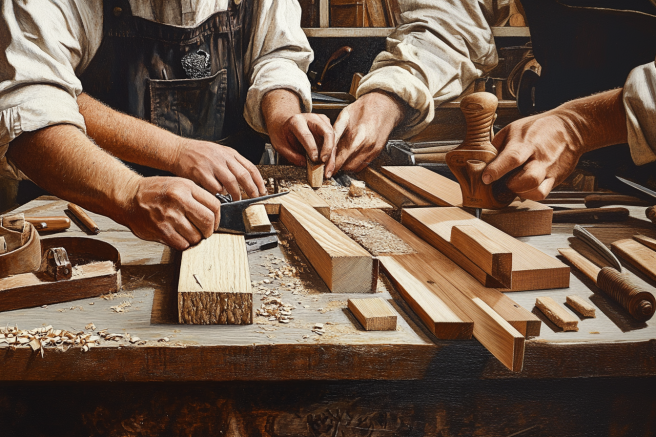Understanding Joints in Woodworking
Definition of a Joint
Ever wonder how those wooden pieces in furniture fit together so seamlessly? That’s the magic of joints! In woodworking, a joint is where two pieces of wood are connected. Think of it as the handshake between two timber pieces, ensuring they stay friends for life.
Types of Wood Joints
Now, let’s dive into the fun part – the different types of wood joints. It’s like exploring the secret world of how things stick together!
Butt Joints First up, we have the butt joint. Simple, this joint is like a basic high-five. You butt two pieces of wood together and secure them with glue, nails, or screws. Easy peasy!
Dovetail Joints Next, let’s talk about dovetail joints. These are the fancy, interlocking fingers of the woodworking world. Imagine your hands clasping together – that’s a dovetail joint. It’s super strong and looks pretty cool, too. Perfect for drawers!
Mortise and Tenon Joints Finally, we have the mortise and tenon joints. Picture a puzzle piece fitting snugly into its spot. One piece of wood (the tenon) fits into a hole cut into the other (the mortise). This joint has been used for centuries because it’s as sturdy as it comes.
Importance of Joints in Woodworking
So, why all the fuss about joints? Well, they’re crucial for the strength and durability of any wooden structure. Without good joints, your furniture would be shaky and weak. Imagine sitting on a chair that falls apart – not fun, right?
Exploring Joinery Techniques
Definition of Joinery
Now that we’ve got joints down, let’s explore joinery. Joinery is the art and science of crafting those joints and assembling wood into beautiful, functional pieces. It’s like being a wood whisperer, knowing exactly how to make each piece fit perfectly.
Common Joinery Methods
Joinery isn’t just about slapping pieces of wood together. It involves precise methods and techniques. Here are a couple of the most common ones:
Cabinet Making Cabinet making is a prime example of joinery at its best. It’s all about creating sturdy, stylish cabinets that stand the test of time. From kitchen cupboards to elegant wardrobes, joiners make it all happen.
Furniture Construction: Ever marvel at a beautifully crafted table or a sleek bookshelf? That’s joinery in action. Furniture construction involves various joinery techniques to ensure each piece is functional and a work of art.
Tools Used in Joinery
Joinery is only possible with the right tools. Joiners use chisels, saws, and planes to shape and assemble wood. It’s like a chef with their knives – the right tool makes all the difference.
Comparing Joints and Joinery
Key Differences
So, what’s the difference between joints and joinery? Think of joints as the building blocks – the individual connections. On the other hand, Joinery is the whole construction process, using those building blocks to create something amazing.
Applications and Use Cases
Joints are everywhere in woodworking, from simple DIY projects to complex architectural structures. Joinery, however, is more specialized and used to create high-quality furniture and cabinetry. It’s like comparing the bricks of a house to the house itself.
Pros and Cons of Each
Joints are essential for any woodworking project and can be simple or complex. Joinery, while more advanced, ensures a higher level of craftsmanship and durability. It’s the difference between assembling a flat-pack bookshelf and custom-building one that lasts generations.
Choosing the Right Professional for Your Project
When to Hire a Joiner
Hiring a joiner is the best option if you’re looking for bespoke furniture or custom cabinetry. They bring a level of expertise and artistry that guarantees top-notch results.
When to Consult a Carpenter
A carpenter is your best bet for general woodworking tasks, like building a deck or framing a house. They’re skilled in broader construction techniques and can handle larger projects.
Tips for Selecting the Right Specialist
Choosing between a joiner and a carpenter can be tricky. Look for their previous work, ask for references, and make sure they understand your vision. It’s like dating—you want someone who understands you and your needs.
Why Choose MGB Joinery for Your Projects
At MGB Joinery, we pride ourselves on blending traditional craftsmanship with modern techniques. Whether you need custom furniture, cabinetry, or any woodworking project, we’ve got you covered. Our expert joiners and carpenters are dedicated to bringing your vision to life with precision and care.
Contact Us for Expert Joinery and Carpentry Services
Ready to transform your space? Contact us today for a consultation. Let’s build something beautiful together!
Frequently Asked Questions (FAQs)
1. What are some common issues with wood joints?
Common issues with wood joints include misalignment, gaps, weak bonds, and wood movement due to changes in humidity. These problems can compromise the strength and appearance of the finished piece.
2. How do I choose the right type of joint for my project?
Choosing the right type of joint depends on your project’s specific requirements. Consider factors like the load the joint will bear, the type of wood you’re using, the desired aesthetic, and your available tools and skills.
3. What is the role of adhesives in joinery?
Adhesives play a crucial role in joinery by providing additional strength to joints. They help bond pieces of wood together, ensuring durability and stability. Common adhesives include wood glue, epoxy, and polyurethane glue.
4. How can I ensure the durability of my wood joints?
To ensure the durability of wood joints, use high-quality materials, precise cutting and fitting, appropriate adhesives, and proper finishing techniques. Regular maintenance, such as tightening screws and applying wood conditioners, also helps maintain joint integrity.
5. Can I learn joinery techniques independently or take a class?
While you can learn basic joinery techniques through books, online tutorials, and practice, taking a class or workshop can provide hands-on experience and expert guidance. Classes can help you master more complex techniques and build confidence in your skills.






